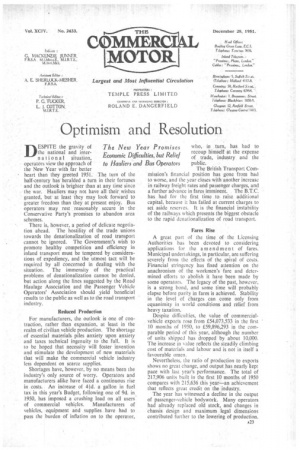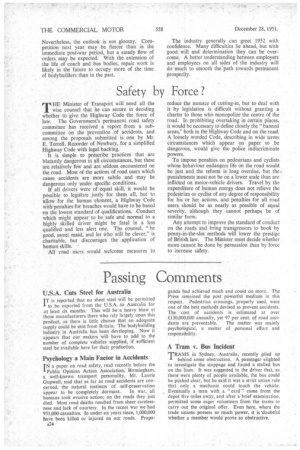Optimism and Resolution
Page 25

Page 26

If you've noticed an error in this article please click here to report it so we can fix it.
DESPITE the gravity of The New Year Promises the national and international situation, Economic Difficulties, but Relief operators view the approach of to Hauliers and the New Year with far better heart than they greeted 1951;The turn of the half-century has heralded a turn in their fortunes and the outlook is brighter than at any time since the war. Hauliers may not have alIt their wishes granted, but at least they may look forward to greater freedom than they at present enjoy. Bus operators may rest reasonably secure in the Conservative Party's promises to abandon area schemes.
There is, however, a period of delicate negotiation ahead. The hostility of the trade unions towards the denationalization of road transport cannot be ignored. The Government's wish to promote healthy competition and efficiency in inland transport must be tempered by considerations of expediency, and the utmost tact will be required by all concerned in dealing with the situation. The immensity of the practical problems of denationalization cannot be denied, but action along the lines suggested by the Road Haulage Association and the Passenger Vehicle Operators' Association should yield beneficial results to the public as well as to the road transport industry.
Reduced Production For manufacturers, the outlook is one of contraction, rather than expansion, at least in the realm of civilian vehicle production. The shortage of essential materials piles anxiety upon anxiety and taxes technical ingenuity to the full. It is to be hoped that necessity will foster invention and stimulate the development of new materials that will make the commercial vehicle industry less dependent on scarce supplies.
Shortages have, however, by no means been the industry's only source of worry. Operators and manufacturers alike have faced a continuous rise in costs. An increase of 4A. a gallon in fuel tax in this year's Budget, following one of 9d. in 1950, has imposed a crushing load on all users of commercial vehicles. Manufacturers of vehicles, equipment and supplies have had to pass the burden of inflation on to the operator, who, in turn, has had to recoup himself at the expense of trade, industry, and the Bus Operators public.
The British Transport Commission's financial position has gone from bad to worse, and the year closes with another increase in railway freight rates and passenger charges, and a further advance in fares imminent. The B.T.C. has had for the first time to raise additional capital, because it has tailed at current charges to set aside reserves. It is the financial instability of the railways which presents the biggest obstacle to the rapid denationalization of road transport.
Fares Rise A great part of the time of the Licensing Authorities has been devoted to considering applications for the amendment of fares. Municipal undertakings, in particular, are suffering severely from the effects of the spiral of costs. Financial stringency has fixed attention on the anachronism of the workmen's fare and determined efforts to abolish it have been made by some operators. The legacy of the past, however, is a strong bond, and some time will probably elapse before parity in fares is achieved. Stability in the level of charges can come only from equanimity in world conditions and relief from heavy taxation.
Despite difficulties, the value of commercialvehicle exports rose from £54,073,533 in the first ' 10 months of 1950, to £59,896,293 in the comparable period of this year, although the number of units shipped has dropped by about 10,000. The increase in value reflects the steadily climbing cost of materials and labour and is not in itself a favourable omen.
Nevertheless, the ratio of production to exports shows no great change, and output has nearly kept pace with last year's performance. The total of 217,906 units built in the first 10 months of 1950 compares with 215,636 this year—an achievement that reflects great credit on the industry. The year has witnessed a decline in the output of passenger-vehicle bodywork. Many operators had already replaced old stock, and changes in 'chassis design and maximum legal dimensions contributed further to the lowering of production. A23 Nevertheless, the outlook is not gloomy. Competition next year may be fiercer than in the immediate post-war period, but a steady flow of orders may be expected. With the extension of the life of coach and bus bodies, repair work is likely in the future to occupy more of the time of bodybuilders than in the past. The industry generally can greet 1952 with confidence. Many difficulties lie ahead, but with good will and determination they can be overcome. A better understanding between employers and employees on all sides of the industry will do -much to smooth the path towards permanent prosperity.












































































